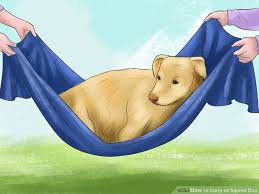
Transporting Injured Dogs
It’s important to have a good understanding how to transport a sick or injured dog in a safe manner, ensuring no further injury or complications occur and no one helping ends up getting bitten.
Please Follow These Recommendations
Handle The Dog As Little As Possible
Handle The Dog Gently
Allow The Dog To Find It’s Most Comfortable Position
Be Aware Not To Put Too Much Pressure On The Abdomen
Reduce Movement To A Minimum
If the dog seems paralysed or unable to get up, a spinal injury is a probability, therefore the dog must be firmly immobilised to prevent further damage.
Find a flat board and then gently slid the dog onto the support. This could be an ironing board or a leaf from a table. If nothing available suitable, use a blanket and adapt it to look similar to a stretcher.
Try and get the owner to reassure their dog by keeping in its vision and talking to it. If the dog is in severe pain it may well be advised to apply a muzzle to prevent anyone getting hurt.
ALL DOG OWNERS SHOULD HAVE A MUZZLE FOR THEIR DOG, OR USE A BANDAGE TO MAKE A DIY MUZZLE.
It’s important to have a good understanding how to transport a sick or injured dog in a safe manner, ensuring no further injury or complications occur and no one helping ends up getting bitten.
Please Follow These Recommendations
- Keep calm and reassure everyone present that you know what you are doing.
- Make a plan and explain to all concerned how you mean to continue
Handle The Dog As Little As Possible
- You want to make the dog comfortable and try and keep it as calm as possible. Use slow, gentle motions when handling a sick or injured dog. Small dogs can be transported in commercial carriers or a cardboard box with a secure lid. Make sure there are small holes in the box to give the dog ventilation.
Handle The Dog Gently
- Rough handling may compound a serious injury by causing further bleeding or turn a simple fracture into an open compound fracture.
Allow The Dog To Find It’s Most Comfortable Position
- If you try and make the dog lie on its side, it may resent this, or if the dog has more difficulty breathing when laid on its side, this may indicate the dog has a chest injury to chest and lungs. This is when it is imperative to allow the dog to find its most comfortable position. Any dog having trouble breathing, if at all possible, raise their head and chest slightly higher than the abdomen.
Be Aware Not To Put Too Much Pressure On The Abdomen
- The dog which is sick/ill may have an acute abdomen. An acute, painful abdomen may be due to a ruptured spleen, perforated gut, or intro-abdominal tumour and any additional pressure to the abdomen when lifting may cause the animal greater discomfort.
Reduce Movement To A Minimum
- When transporting an injured dog it is very important to keep them as still as possible. This can be achieved by tying the dog to a board. This is very important to do this if you are dealing with an unconscious dog, a dog that may be suffering from a spinal cord injury and from a fracture – DO NOT TRY AND SPLINT A FRACTURE!
If the dog seems paralysed or unable to get up, a spinal injury is a probability, therefore the dog must be firmly immobilised to prevent further damage.
Find a flat board and then gently slid the dog onto the support. This could be an ironing board or a leaf from a table. If nothing available suitable, use a blanket and adapt it to look similar to a stretcher.
Try and get the owner to reassure their dog by keeping in its vision and talking to it. If the dog is in severe pain it may well be advised to apply a muzzle to prevent anyone getting hurt.
ALL DOG OWNERS SHOULD HAVE A MUZZLE FOR THEIR DOG, OR USE A BANDAGE TO MAKE A DIY MUZZLE.

